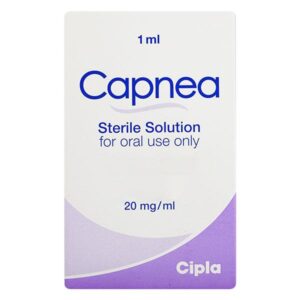CAFFEINE + CITRATE
Caffeine: Caffeine is a central nervous system stimulant and a methylxanthine alkaloid. It is commonly found in beverages like coffee, tea, energy drinks, and some soft drinks. Caffeine is also available in tablet or powder form as a dietary supplement.
The main use of caffeine is to increase alertness and wakefulness. It is often used to combat fatigue, enhance cognitive function, improve focus and concentration, and improve athletic performance. Additionally, caffeine is sometimes used to treat migraines and headaches, as it can constrict blood vessels in the brain and reduce pain.
The mechanism of action of caffeine involves blocking the effects of adenosine, a neurotransmitter that promotes sleep and relaxation. By blocking adenosine receptors in the brain, caffeine increases neural activity and stimulates the release of other neurotransmitters like dopamine and norepinephrine, leading to increased alertness and decreased fatigue.
The dose of caffeine varies depending on the form and purpose of use. For a cup of coffee, the average caffeine content ranges from 95-200 mg. For tea, it ranges from 20-90 mg per cup, and for energy drinks, it can be as high as 50-300 mg per serving. Caffeine tablets or powder supplements usually contain higher concentrations, ranging from 100-200 mg per pill or scoop.
Side effects of caffeine can include increased heart rate, elevated blood pressure, restlessness, anxiety, nervousness, insomnia, digestive issues (such as stomach pain or diarrhea), headaches, and dehydration. It is important to note that caffeine affects individuals differently, and some people may be more sensitive to its effects or may experience adverse reactions at lower doses. It is also worth mentioning that caffeine is addictive, and regular consumption can lead to dependence and withdrawal symptoms, such as fatigue, irritability, and headaches, when discontinued abruptly. As with any substance, moderation and personal tolerance should be considered when using caffeine.
Citrate: Citrate is a medication that contains citric acid. It is commonly used as an additive in some food and beverages, as well as in the pharmaceutical industry for various purposes. Citrate can also refer to medications that contain citric acid in combination with another substance, such as citrate salts.
Citrate salts, such as sodium citrate or potassium citrate, are used in medicine for different purposes. These salts work by alkalinizing the urine, which can be helpful in treating conditions such as kidney stones, urinary tract infections, and metabolic acidosis.
The mechanism of action of citrate salts is related to their ability to neutralize excess acid in the body. When they are metabolized, they convert to bicarbonate, which helps to increase the pH of urine, making it less acidic.
The dose of citrate salts varies depending on the specific condition being treated and the individual’s medical history. It is important to follow the prescribed dosage and consult a healthcare professional for accurate dosing instructions.
While citrate is generally safe, it can have some side effects. Common side effects of citrate salts may include gastrointestinal symptoms such as nausea, stomach pain, diarrhea, or vomiting. These side effects are usually mild and transient. However, in rare cases, high doses of citrate salts can lead to metabolic alkalosis, a condition characterized by an excessively high pH level in the blood. Symptoms of metabolic alkalosis may include muscle twitching, hand tremors, confusion, or convulsions.
It is crucial to inform your healthcare provider about any existing medical conditions (such as kidney or liver disease) and medications you are currently taking to ensure the safe and effective use of citrate salts. Additionally, it’s important to discuss potential drug interactions and any allergies you may have.
Overall, citrate salts are commonly used and well-tolerated medications when used as directed and under the supervision of a healthcare professional.

